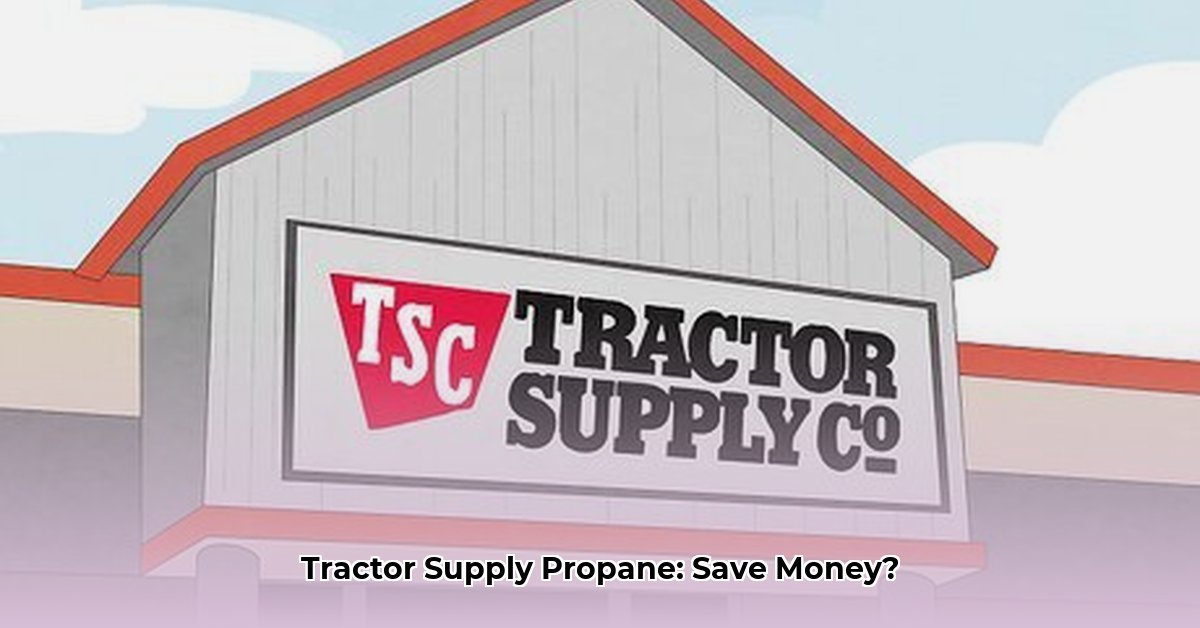
Does Tractor Supply Refill Propane Tanks? A Comprehensive Look
Need to refill your propane tank? Tractor Supply Company (TSC) offers a convenient propane refill service, but is it the right choice for your farming operation? This article analyzes the service's convenience, cost-effectiveness, and environmental impact, providing actionable intelligence to help you make an informed decision. For more information on TSC's offerings, check out their car battery selection.
The Convenience Factor: Quick and Easy Refills
TSC's propane refill service prioritizes simplicity. Farmers can refill their tanks directly at participating TSC locations, paying only for the propane used. This eliminates the hassle of exchanging tanks, providing a flexible solution for various tank sizes and propane needs. The ease and speed of the process are significant advantages for busy farmers. Is this streamlined refill process a significant time saver for your farm operations?
Cost Analysis: A Budget-Friendly Option?
The pay-per-gallon system offers potential cost savings compared to traditional tank exchange programs. You avoid paying for unused propane, resulting in a potentially lower overall cost. However, the actual savings vary depending on local propane prices and individual consumption. Comparing TSC's prices to other suppliers in your area is essential for determining cost-effectiveness. How does the cost of TSC's propane refills compare to your current supplier?
Safety and Reliability: Prioritizing Farmer Safety
TSC's propane refill stations adhere to strict safety protocols, including thorough tank inspections before refueling, following Department of Transportation (DOT) guidelines, and employing industry best practices. This commitment to safety provides peace of mind, ensuring a secure refueling experience for farmers. The rigorous safety procedures employed by TSC are reassuring for responsible propane management, aren't they?
Environmental Considerations: Balancing Convenience and Sustainability
While convenient, propane use contributes to greenhouse gas emissions. TSC's pay-per-gallon system minimizes waste compared to tank exchanges, but the transportation and combustion of propane remain significant environmental concerns. Additionally, TSC hasn't publicly released detailed sustainability goals regarding propane sourcing or its environmental impact. This lack of transparency is a factor to consider. Do the environmental implications of propane use outweigh the convenience of TSC's refill service for your farming operation?
Weighing the Pros and Cons: An Objective Assessment
Here's a summary of the advantages and disadvantages to aid your decision-making process:
| Advantages | Disadvantages |
|---|---|
| Convenient, pay-per-gallon system | Significant environmental impact of propane use |
| Potentially cost-effective | Lack of transparency regarding TSC's sustainability initiatives |
| Accommodates various tank sizes | Propane transportation contributes to emissions |
| Rigorous safety protocols | Reliance on a fossil fuel source |
Actionable Steps for Farmers and TSC
For Farmers:
- Analyze Propane Usage: Identify areas where propane consumption can be reduced through improved efficiency or alternative practices (e.g., adopting more energy-efficient equipment).
- Explore Alternatives: Investigate sustainable alternatives like biogas or renewable energy sources where feasible.
- Carbon Offsetting: Consider investing in carbon offsetting programs to mitigate your environmental footprint.
For Tractor Supply Company:
- Invest in Renewable Energy: Transition refill station power sources to renewable energy.
- Conduct Life Cycle Analysis: Assess the full environmental impact of the propane supply chain.
- Explore Sustainable Alternatives: Research and implement renewable propane or other eco-friendly fuels.
- Enhance Transparency: Publicly disclose sustainability goals and progress.
Conclusion: Making Informed Choices for a Sustainable Future
Choosing a propane supplier requires balancing convenience, cost, and environmental responsibility. By considering the factors outlined above, farmers can make informed decisions that align with both their operational needs and their commitment to sustainable agricultural practices. The future of farming depends on such choices.